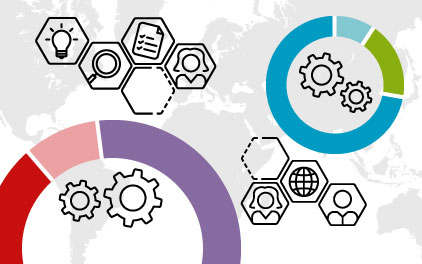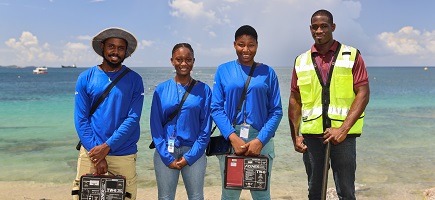

- SECURUTY, RECONSTRUCTION AND PEACE
- GOVERNANCE AND DEMOCRACY
- ENVIRONMENT AND CLIMATE CHANGE
- ECONOMIC DEVELOPMENT AND EMPLOYMENT
Georgia
GIZ local staff
National employees: 129
International employees: 26
Integrated experts: 1
(as at: 31.12.2024)
The Deutsche Gesellschaft für Internationale Zusammenarbeit (GIZ) GmbH has been working in Georgia since 1992 and has a country office in Tbilisi.
Since gaining its independence from the Soviet Union in 1991, Georgia has implemented wide-ranging reforms, made economic progress and significantly reduced levels of poverty. Yet challenges remain. Economic development is being held back by a shortage of skilled workers and the fact that training is not sufficiently aligned with the labour market’s needs. The country is also facing challenges in meeting its climate targets, conserving resources and adapting to climate change.
Georgia is forging closer economic and political ties with the European Union (EU), and signed an association agreement in 2014. In December 2023, the country became an EU candidate country.
GIZ is implementing projects in Georgia mainly on behalf of German ministries and the EU. The German-Georgian projects focus on the following areas:
- Economic development, training and employment
- Climate change and energy (just transition)
- Good governance
GIZ is supporting improvements to the business community’s quality infrastructure in order to make companies more competitive and help them to align their practices with EU standards. To address the shortage of skilled labour in Georgia, GIZ is also strengthening the vocational training system, for example through training courses with a practical focus in growth sectors such as tourism, logistics and construction.
To enable Georgia to meet its climate targets, GIZ is working on urban development and sustainable mobility projects. For example, reforms are being implemented to promote climate-friendly and connected mobility. With the aim of protecting forests, reducing greenhouse gas emissions and improving the living conditions of rural households, GIZ is also supporting measures to encourage resource-conserving forest management and energy efficiency.
GIZ fosters good governance by promoting local mechanisms for citizen participation, as a result of which the municipalities adopt budgets that they have developed together with the local population. The budgets finance proposals made by the public – such as new roads and stable internet access.
Regional cooperation in the framework of the EU’s Eastern Partnership also plays an important role in Georgia. GIZ is implementing regional projects that focus on issues such as administrative reform, civil society and young people, trade, environmentally friendly agriculture and digitalisation. In addition, GIZ is carrying out activities in Georgia as part of global projects.




